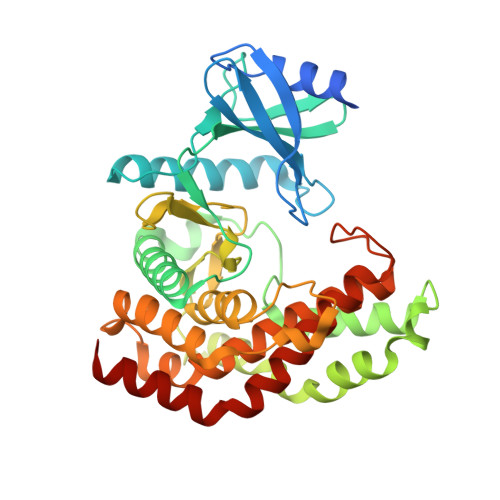Insights into the binding specificity and catalytic mechanism of N-acetylhexosamine 1-phosphate kinases through multiple reaction complexes.
Wang, K.C., Lyu, S.Y., Liu, Y.C., Chang, C.Y., Wu, C.J., Li, T.L.(2014) Acta Crystallogr D Biol Crystallogr 70: 1401-1410
- PubMed: 24816108
- DOI: https://doi.org/10.1107/S1399004714004209
- Primary Citation of Related Structures:
4OCJ, 4OCK, 4OCO, 4OCP, 4OCQ, 4OCU, 4OCV - PubMed Abstract:
Utilization of N-acetylhexosamine in bifidobacteria requires the specific lacto-N-biose/galacto-N-biose pathway, a pathway differing from the Leloir pathway while establishing symbiosis between humans and bifidobacteria. The gene lnpB in the pathway encodes a novel hexosamine kinase NahK, which catalyzes the formation of N-acetylhexosamine 1-phosphate (GlcNAc-1P/GalNAc-1P). In this report, seven three-dimensional structures of NahK in complex with GlcNAc, GalNAc, GlcNAc-1P, GlcNAc/AMPPNP and GlcNAc-1P/ADP from both Bifidobacterium longum (JCM1217) and B. infantis (ATCC15697) were solved at resolutions of 1.5-2.2 Å. NahK is a monomer in solution, and its polypeptide folds in a crescent-like architecture subdivided into two domains by a deep cleft. The NahK structures presented here represent the first multiple reaction complexes of the enzyme. This structural information reveals the molecular basis for the recognition of the given substrates and products, GlcNAc/GalNAc, GlcNAc-1P/GalNAc-1P, ATP/ADP and Mg(2+), and provides insights into the catalytic mechanism, enabling NahK and mutants thereof to form a choice of biocatalysts for enzymatic and chemoenzymatic synthesis of carbohydrates.
Organizational Affiliation:
Genomics Research Center, Academia Sinica, Taipei 115, Taiwan.

















